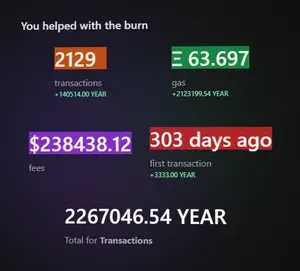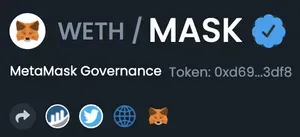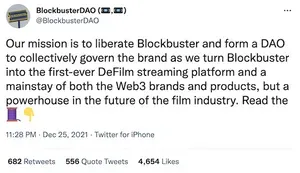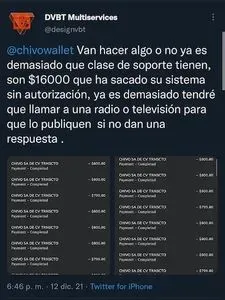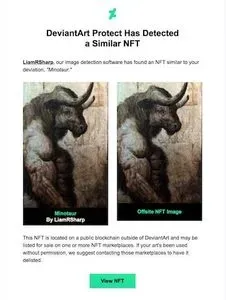SEC sues CrowdMachine founder, alleges illegal ICO and operation that secretly diverted funds to gold mining companies
Mozilla pauses cryptocurrency donations after backlash
Internet shutdown in Kazakhstan reveals that 12–18% of all Bitcoin mining is done there, which has alarming energy implications
Pudgy Penguins NFT project founders apparently try to make off with all the money they've raised
Artist discovers her work has been stolen and published as 86,000 NFTs
Kosovo issues an emergency ban on cryptocurrency mining in efforts to ease electricity shortages
Franklin apologizes for shilling an NFT project (that later rug pulled) without adequately disclosing he was being paid
Solana experiences outage or "congestion", depending on who you believe
After being hospitalized for digestion issues after selling farts in a jar (really), a former 90 Day Fiancé star turns to NFTs
The Sunflower Farmers blockchain game DDoSes the Polygon blockchain for several days
ArbixFinance appears to rug pull, making off with at least $10 million
Samsung announces its new smart TVs will include an NFT marketplace
Crypto gambling service Polymarket shut down and fined $1.4 million by the U.S. CFTC
Matt Damon stars in a truly cringeworthy ad for Crypto.com
Blockchain game CryptoBike apparently rugpulls only days after launch
- "CryptoBike showing signs of scam", Sài Gòn Giải Phóng
- "Dự án game NFT Việt bị nhà đầu tư 'săn lùng' ra cả địa chỉ giả do dùng chiêu cho chiếm đoạt 1,4 tỷ USD rồi bỏ trốn", Diễn đàn Doanh nghiệp
Some of Tinyman's liquidity pools are drained of around $3 million
NFT collector loses $38,000 in what he believes is an OpenSea or Rarible glitch
Digiconomist reports that Bitcoin consumed about as much energy in 2021 as the whole country of Argentina
Tether, the stablecoin that claims to be fully backed by actual currency, adds $1 billion to their supply
Square Enix CEO acknowledges he will be disappointing gamers who "play to have fun" with his announcement that they are getting into web3
$YEAR creator rings in the New Year by rugpulling about $225,000
- "Airdrop culture could pose integral threat to DeFi industry", Cointelegraph
- "Ethereum Project Airdrops Scam Token, Then Pulls the Rug", Crypto Briefing
NFT collector scammed out of $2.2 million in a phishing attack
"I been hacked. all my apes gone." tweeted Kramer, in a phrase that ultimately became a catchphrase of the NFT world (and its critics).
After asking for help on Twitter, OpenSea froze the stolen assets, preventing them from being traded on their platform. Some commenters noted that the redress (asset freezing and flagging of suspicious accounts) was only possible because OpenSea is a centralized platform with a large amount of power in the NFT arena, which some see as antithetical to the supposed ideals of web3. This also raises the question of whether BAYC themselves have a way to determine "legitimate ownership" of their NFTs, which in addition to being expensive status symbols also grant their owners exclusive perks including merchandising rights and access to events.
p>Blatant copy of Solana's popular "Baby Ape Social Club" rakes in more than $50,000 before being taken down by OpenSea
"1st LGBTQ+ Cryptocurrency" brings pinkwashing to crypto
"No network can withstand the electricity consumption that is recorded there", says energy company chairman of the effects of cryptocurrency mining in Georgia
Traders duped out of $1.8 million in a fake MetaMask governance token scheme
- "Fake MetaMask Governance Token Soars 2600% and Gets Rug-Pulled", CryptoPotato
- "$1.8M Lost to Fake MetaMask Token Honeypot Scam", Crypto Briefing
Rapper Waka Flocka Flame has an OpenSea account hacked to the tune of $19,000
MetaSwap Gas project rugpulls about $600,000
MetaDAO project rugpulls for more than $3.2 million
- "MetaDAO Makes Off With $3.2M in Rug Pull", Cryptobriefing
Another NFT project sells NFTs depicting real people without their consent
The "Cipher Punks" NFT project tried to sell NFTs with illustrations of various cypherpunks, or at least the ones that were listed on Wikipedia. The project said that it intended to "[honor] everyone involved in the CypherPunk movement. They are our heroes, and we need to recognize them". Apparently honoring them did not also involve asking for their consent to be used in the project, as Jillian York tweeted on December 26, "I don't approve of this whatsoever and would like it removed."
ItsBlockchain, the group behind the project, subsequently announced that they would scrap the project and apologized. This apology rang a little hollow, to me, after they retweeted a tweet saying "never meet your heroes" in reference to the individuals asking that the project stop using their likeness without their consent, for their own profit.JungleFreaks and Sandbox NFTs are stolen from a collector
A DAO forms with the goal of "liberating" Blockbuster, hoping to raise $5 million from NFTs
Elon Musk tweeting a photograph of his dog in a Santa suit somehow pumps a memecoin
An attempted governance attack aims to defraud 25 million MIR (about $64.2 million) from Terra's Mirror protocol
Steve Bannon touts a "Fuck Joe Biden" coin that looks designed to scam investors
NFT collector scammed out of Bored Ape NFT: "This was my kids college. My mortgage."
Open source contributors and advocates are surprised to find photographs of themselves being sold as NFTs
Funko Pop launches Bob Ross NFTs in apparent disregard of Ross's wishes
Visor Finance is hacked for about $8.2 million
- "$8.2M Lost as Visor Finance Suffers Latest DeFi Hack", CryptoBriefing

















